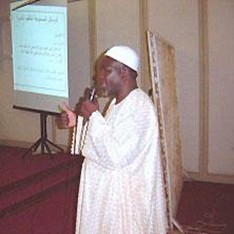Speeches Shim

Developing and deepening relationships with religious and community leaders is part of USAID’s long-standing work to promote sustainable health practices. Community and religious leaders are able to connect with their peers and communities, which enables leaders to educate parents about the importance of caring for their children, respect for women's choices and the importance for men to make informed decisions about the health of their families.
Imam Mamadou Traoré’s Friday routine consists of more than preparing Islamic teachings and prayers. Before Friday prayers, he also educates community members and his fellow religious leaders about the health benefits that come with birth spacing. Imam Mamadou Traoré is one of many leaders in Mali involved in providing health training to religious leaders, in partnership with USAID.
Through USAID’s support, religious leaders learn about the promotion of better health behaviors and the impact they can have on the health of their communities. As influential members of their communities, religious leaders then develop their own model for educating about the importance of caring for children and about how to make informed decisions as a couple about the health of their family.
By partnering with religious and community leaders in Mali, USAID works to strengthen countries’ ability to provide health services to all of its citizens, particularly in areas where improved health practices will contribute to local and regional stability. Religious and community leaders deliver messages to hard-to-reach communities where they have trusted relationships with the community members they serve, augmenting the capacity of local and national governments to reach these groups.
Mali has a rapidly growing, young population, which has doubled over the past 20 years: less than 10 percent of women of reproductive age use a modern method of family planning and two-thirds of all Malians are under 25 years old. Lack of access to vital health services, including access to voluntary family planning methods, contributes to high rates of maternal and child mortality rates. With a young and fast-growing population, health education is essential to reduce risk factors and promote healthy behaviors for women, children, and their families.
As a result of Imam Mamadou Traoré’s work as a health champion, he has helped to inform more than 250 additional religious leaders since September 2016, building a network of other imams who advocate for respectful relationships among families, including joint decisions about family planning, respectful resolution of disputes, and treating everyone equally (including those with HIV/AIDS). Imam Mamadou Traoré and his entire network of religious and community leaders care deeply about the well-being of their followers. They serve as strong leaders and role models that help to create more stable and secure communities.
Through USAID’s work with religious and community leaders, we improve the health of women in the community, who are often themselves family caretakers. USAID’s work ensures that community leaders can create equitable change that can last beyond a single generation, and benefits countries like Mali throughout their development journey.

Comment
Make a general inquiry or suggest an improvement.